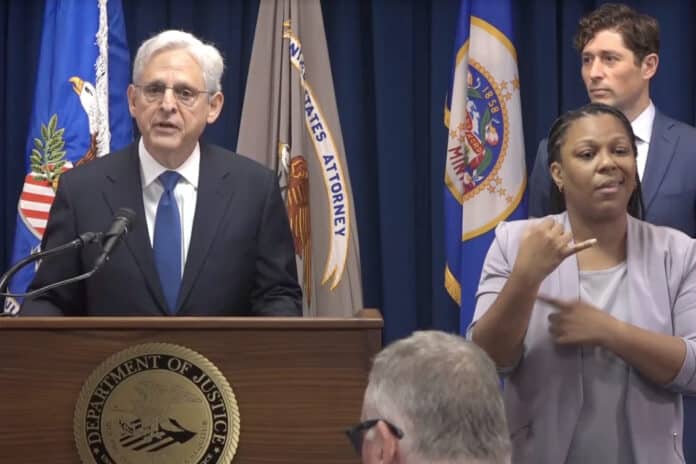
While acknowledging that it “can always strive to be better,” the Police Officers Federation of Minneapolis criticized a recent U.S. Department of Justice report because it “condemns an entire agency and its employees based on anecdotes.”
U.S. Attorney General Merrick Garland was in Minneapolis Friday to announce the findings of the federal government’s “pattern or practice” investigation into the Minneapolis Police Department.
“Our review focused on MPD as a whole, not on the actions of any individual officer. We observed many MPD officers who did their work with professionalism, courage, and respect. But the patterns or practices we observed made what happened to George Floyd possible,” Garland said at a press conference alongside city leaders such as Mayor Jacob Frey and Police Chief Brian O’Hara.
The Department of Justice opened its investigation into the city and its police department in April 2021, a day after former police officer Derek Chauvin was found guilty of murdering George Floyd.
In a 92-page report on its civil investigation, the DOJ says it has “reasonable cause” to believe the city and its police department “engage in a pattern or practice of conduct that deprives people of their rights under the Constitution and federal law.”
The report accuses MPD of using excessive force, including “unjustified” deadly force, unlawfully discriminating against black and Native American people, violating the rights of people engaged in protected speech, and discriminating against people with behavioral health disabilities.
Federation President Sgt. Sherral Schmidt said the report correctly recognizes the “stark economic disparities in Minneapolis” and the “emotional and psychological toll” of working in law enforcement. This, she said, has contributed to “the fact that today there are 300 fewer officers in the MPD than there were just three years ago.”
“The report goes on to basically ignore those important factors and instead condemns an entire agency and its employees based on anecdotes that were presented with a lack of context — such as the number of encounters that were found to be problematic relative to the number of the same type of encounters that were handled appropriately; or whether the accused officers were disciplined or whether they are even still working for MPD,” she commented.
“In some instances, the report presents incidents in a misleading light such as repeating allegations that were rejected by neutral arbitrators. Rather than engage in a point by point analysis, suffice to say that it is hard to imagine that a two-year long investigation of thousands of actions by the people of any organization the size of MPD would not uncover several mistakes of varying levels of severity,” Schmidt added.
Schmidt believes the report will merely be “used by those who are inclined to have an anti-police bias to justify their beliefs while those who are more pro-police will question the report’s findings.”
“As with most things, the truth lies somewhere in the middle. Over the years, there have been exponentially more instances of heroic and selfless acts performed by dedicated officers in harrowing circumstances than those described in the report,” she said.
Schmidt urged Minnesotans to recognize that poverty, not race, is the most significant factor contributing to police interactions.
“Contrary to common belief, the Federation is not nor has it ever been an impediment to improvement,” she continued, noting that many of the remedial steps outlined in the report “mirror actions the Federation has recommended.”
Schmidt concluded by encouraging elected officials to consider the impact of every reform on the ability to “attract and retain police officers.”
“The issues identified in this report can’t be shouldered by the police officers alone. It will require the elected officials to provide the support and resources to do the work,” she said. “It will require immense work in the community to build trust and it will require department leadership to be leaders.”









